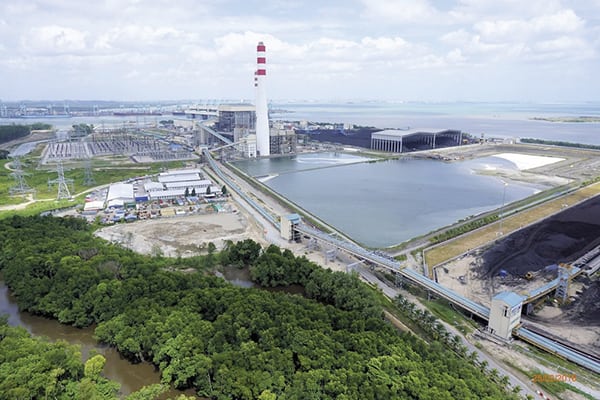Malaysia Commissions 1-GW Ultrasupercritical Coal Plant
Malaysia, a country that has historically depended on oil and natural gas for energy, put online a $1.67 billion ultrasupercritical coal-fired power plant this March.
Malaysian firm Malakoff Corp.’s giant 1-GW Tanjung Bin Energy Power Plant (T4) entered commercial operation this March, on schedule, four years after construction began (Figure 6).
GE’s Steam Power Systems and consortium partners Mudajaya and Shin Eversenda executed the engineering, procurement, and construction agreement for the plant. GE also supplied key equipment—including the steam turbine and generator, its ultrasupercritical boiler, and environmental control systems—and was responsible for the overall integration and commissioning of the plant. The company said that the plant operates on GE’s “most modern” steam turbine and generator technology. Its emissions control system is also noteworthy: It uses low–nitrogen oxide burners and a seawater flue gas desulphurization facility and fabric filters.
According to Malakoff, the T4 plant is Malaysia’s first independent power project awarded by the Energy Commission via a competitive bidding process. Power from the project will be sold under a 25-year power-purchase agreement signed with Malaysian utility Tenaga Nasional. A steady, quality supply of coal for the plant has been ensured by an agreement between the plant owner and its coal subsidiary, TNB Fuel Services, Habib Husin, Malakoff’s acting CEO, said.
The plant is an interesting choice for Malaysia, whose domestic natural gas supplies are depleting and which must import all its coal from a region where demand is high and fuel prices are volatile. TNB Fuel Services gets most of its coal from Indonesia, Australia, and South Africa. The country is meanwhile grappling with the challenges of under-investment (blamed on subsidized power pricing), aging infrastructure, and frequent gas supply curtailment, which has forced generators to increase use of high-cost alternatives like distillate.
At the start of 2015, about 42.3% of Peninsular Malaysia’s installed 22 GW was coal-fired and 51.8% was natural gas–fired. The country, which says it cannot depend on renewables to provide baseload power and recognizes that hydropower capacity in Peninsular Malaysia is nearly fully developed, is exploring introducing nuclear power. If it does not go the nuclear route, it will be forced to depend heavily on fossil fuels to meet power demand, which is expected to soar by 2.3%, on average, per year until 2030. By 2020, forecasts foresee coal dominating the country’s power mix (at 53%), with gas playing a more minor role (29%), and the remainder made up by hydro, renewables, and oil.
—Sonal Patel, associate editor
